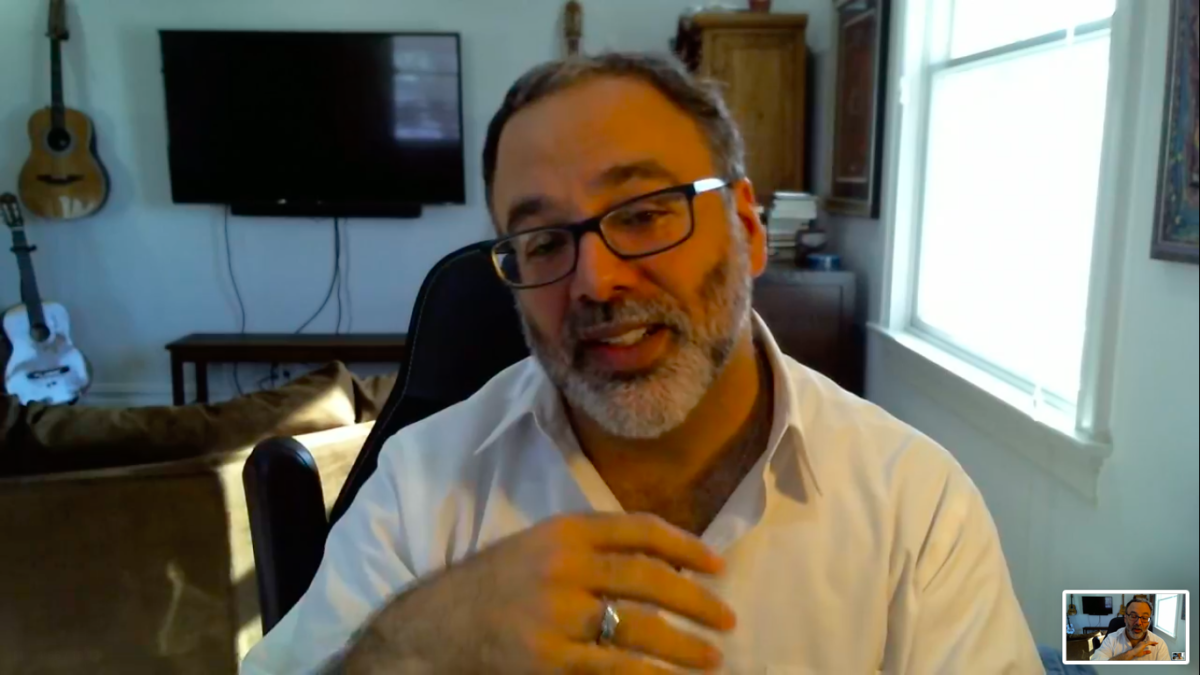Your Daily Phil: Rabbi Creditor’s completion + Celebrating International Women’s Day
Good Monday morning!
David Bernstein has left his post as CEO of the Jewish Council of Public Affairs (JCPA) to start a new, for-profit organization with sociologist Ilana Redstone, a professor at the University of Illinois at Urbana-Champaign. Bernstein came to the JCPA from The David Project, a campus Israel advocacy organization that merged with Hillel International in 2017, and also worked for 13 years at the American Jewish Committee.
Bernstein said he was inspired to start the new group, called Viewpoint, because he saw too many non-profits, including some in the Jewish community, institute diversity training that squelched questioning and debate. “I’m not taking this stance because I’m on the right, I’m taking this stance because I want to be comfortable on the left,” Bernstein told eJewishPhilanthropy.
Viewpoint is associated with Counterweight, a U.K.-based non-profit whose mission is the defense of the marketplace of ideas against the imposition of ideology.
BEGINNING AGAIN
Pandemic-era online study group celebrates completing Torah cycle


Facebook Live Screenshot
Rabbi Menachem Creditor and the UJA-Federation of New York started their weekday Facebook Live Torah study sessions as a short-term response to the pandemic. Today, Creditor and those who tune in will hold a siyum, a Hebrew word meaning “completion,” that describes a traditional celebration of both the end of a cycle of study and its renewal. Creditor said his genre-bending online sessions were as much for him as for anyone else. “This was about my own sense of vulnerability,” he told eJewishPhilanthropy’s Helen Chernikoff about the origins of the idea last March. “Here we were, suddenly apart from everyone. I was afraid I wouldn’t have the chance to teach and learn and do something that was defining for me, not only as a rabbi, but as a person,” he said.
Morning Torah: Ordained by the Jewish Theological Seminary in 2002, Creditor served as a pulpit rabbi in Sharon, Mass., and Berkeley, Calif., and also founded the group Rabbis Against Gun Violence in 2016. He became UJA’s scholar-in-residence in 2018, focused on serving as a religious teacher to staff and supporters, but also holding public classes and lectures and traveling — to the AIPAC policy conference in Washington, D.C., for example, and to a civil rights mission in Selma, Ala.. He had long used Facebook Live and YouTube to expand the number of people his teachings could reach, and had the idea in early March 2020 that the broader community, isolated from each other by state-mandated lockdowns, could connect online. Creditor found an advocate in Mark Medin, an executive vice-president at the charity, who helped push “Morning Torah” online on March 18, 2020, Creditor said.
Early days: It took a few weeks for Creditor to find his rhythm. “At first I was broadcasting from my side of the bedroom,” he said. “People would comment, ‘It’s so nice to see your home, maybe you should close your bathroom door.” William Daroff, the CEO of the Conference of Presidents of Major American Jewish Organizations, has made the broadcast part of his pandemic life, tuning in three or four times a week. The greetings and comments have created a true sense of community, he said, bringing him into contact with both people he already knows as well as new faces. “One of the limitations of the pandemic is how many people we interact with,” he said. “The sessions are liberating; they make the house arrest we’re all under a little bit less confining.” Typically, about 100 people attend the live session, and then about 900 more watch it over the course of a day, Creditor said.
On the hill
Nonprofits chalk up wins in Senate’s $1.9 trillion COVID relief bill


Senators stand and applaud support staff before the final vote on the Senate version of the COVID-19 relief bill in the Senate on March 6, 2021; AP photo
The Senate’s 50-49 passage of a $1.9 trillion coronavirus relief package on Saturday was hailed as a significant victory by many Jewish community leaders who had lobbied legislators to include more provisions to support nonprofits and human services. The package includes an expansion of the Paycheck Protection Program allowing larger nonprofits to qualify for loans and provides a significant increase in unemployment reimbursements for self-insured nonprofits, as well as aid to state and local governments and an increased child tax credit. Jewish Insider’s Marc Rod spoke with lobbyists involved with the bill about its key provisions.
Back to school: In a win for parochial schooling advocates, the Senate added an additional $2.75 billion in designated aid for non-public schools — matching the amount included in the December 2020 relief bill and replacing a more limited funding stream that the House had included in its relief bill. Under the provisions in the Senate bill, non-public schools deal directly with state education agencies to apply for funding, rather than going through local school districts to determine what spending is covered. Orthodox Union Advocacy Center executive director Nathan Diament credited Senate Majority Leader Chuck Schumer (D-NY), as well as Sen. Ben Cardin (D-MD), for spearheading the effort to include the funding.
Helping hand: Elana Broitman, the Jewish Federations of North America’s senior vice president for public affairs, highlighted other provisions of interest to the federations’ umbrella group in the package. Those include transportation to vaccine sites and mobile vaccinations for homebound seniors, increased funding for older Americans, nutrition assistance and child-care block grants. The bill also provided an additional $510 million for the Emergency Food and Shelter Program, which JFNA has “been a key proponent of,” Broitman said. The EFSP program supports programs like food pantries and rent assistance.
Inflection Point
On International Women’s Day, let’s advance safety, respect, and equity in the workplace


Canva
This International Women’s Day — exactly three years since the founding of the Safety Respect Equity Network — I’m feeling especially grateful for the grit and resilience of working women of every race and class, and in every industry, writes Elana Wien in an opinion piece for eJewishPhilanthropy.
Challenge: We are at a key inflection point in our work to build a new world — a better world — that honors the dignity of everyone in the workforce. As a national Jewish network of more than 140 organizations committed to creating safe, respectful, and equitable Jewish workplaces and communities in North America, SRE Network has a bold mandate. Together, we are examining our current reality and encouraging leaders in the Jewish community to take action, particularly as the pandemic continues.
End game: This work is not easy. It cannot be done in a day or even a year. But we all need to begin somewhere and do our part to build a world in which everyone is valued. This International Women’s Day, I call upon every Jewish community leader to pledge to take meaningful action to advance equity and dignity for all.
Empowering Women
We need a Jewish sisterhood for global change


SEWA
The pandemic has us yearning for those fundamental connections that empower us. For many, they were always readily available, and remain so, even now from a distance, writes Avital Sandler-Loeff in an opinion piece for eJewishPhilanthropy.
Beginnings: Over the past year I’ve often thought about an encounter I had two decades ago when I was pregnant with my first daughter. I was in the Old City in Jerusalem and needed to find a restroom. When I got to the entrance, I encountered a Roma woman, not more than 20 years old, lovingly bathing her three toddlers outside. She and I could not be more different. She was dressed in rags, clearly in need, and beset by worries. I was ever the intellectual Jerusalemitewith my designer glasses and lofty ideals.
‘Ask’: On this International Women’s Day, I’m calling on the Jewish community and Israel to recognize the critical role we can play in building connections and impactful interventions empowering women and girls. Some may question why we, without limited resources and challenges of our own, should engage in this work outside our community. In truth, we could turn our backs and plod on alone. But if the pandemic has taught us one thing, it is that we are all connected to one another and the welfare of a single person can mean the difference between life and death to countless others.
Worthy Reads
Good Speed: Recent decades have wrought changes on the norms and narratives that shape philanthropy — changes that the COVID-19 pandemic and police killing of George Floyd have amplified, writes Ben Soskis, a historian of Jewish philanthropy who is also a senior research associate at the Urban Institute, in a new report. He names three shifts: the increasing replacement of private by public giving; the resurgence of the “small donor” and the new importance of rapid response in philanthropy. [UrbanInstitute]
Almost There: The emerging difficulties in the distribution of the COVID-19 vaccine are a case study in what social scientists call “last mile problems,” a term that originated in telecommunications to describe the seeming paradox that the end of the wiring process was the most difficult and expensive. Most states managed to efficiently vaccinate health care workers and the elderly, but now many are struggling to accommodate the rapid increase in numbers beyond those highest-priority groups. Scheduling technology is failing, and ethical questions around priority are becoming increasingly contentious, report Elaine Kamarck and William A. Glaston in Brookings Institution’s “Fixgov” blog. [BrookingsInstitution]
Higher Ed: Two campus chaplaincy organizations — the National Association of College and University Chaplains and the Association of College and University Religious Affairs — will announce today that they will merge to better respond to the way spiritual life on campus continues to diversify to include not only a wider range of traditional faiths, but also the “Nones,” who identify as spiritual without adhering to a particular religion, explains Paul Brandeis Raushenbush for Religion News Service. The Association for Chaplaincy and Spiritual Life in Higher Education will take as its mission both service to individuals and groups, and the weaving together of a single, spiritual campus community. [RNS]
Pandemic Spike: For every dollar contributed to a community foundation’s donor-advised fund in 2020, 87 cents was donated to a nonprofit — up from 75 cents per dollar in 2019, writes Michael Theis in the Chronicle of Philanthropy. The pandemic motivated donor-advised funds managed by community foundations to make more grants, according to a new survey from the Community Foundation Public Awareness Initiative. The funds distributed 41% more in 2020 — $6.7 billion — than in 2019. [ChroniclePhilanthropy]
Community Comms
Apply! Want to join the team at Jewish Insider/eJewish Philanthropy? We’re looking for a top-notch philanthropy editor. Learn more here.
Be featured: Email us to inform the eJP readership of your upcoming event, job opening, or other communication.
Word on the Street
A search committee at Tel Aviv University recommended the appointment of Dafna Meitar-Nechmad as the next chair of the TAU Board of Governors … The Palo Alto JCC haslaunched a kosher food hall with Yemeni breads, sushi and more … The Jewish Community Response and Impact Fund (JCRIF) is hosting an informational webinar March 10 to answer questions about their new request for proposals…
Song of the Day


YOUTUBE
Israeli singer Yuval Dayan released a new song today titled ??? ?????, translated to “You are in everyone.”
Birthdays


Orange Fruit Bowl via Wikimedia Commons
Actress and comedian, Milana Vayntrub…
Jazz pianist and composer, Dick Hyman… Congressman since 2013 (D-CA-47), Alan Stuart Lowenthal… British television executive and member of the House of Lords, Baron Michael Grade (family name Winogradsky)… Judaism and Science blogger, Roger Price… Lyricist, singer and New York Times best-selling author, Carole Bayer Sager… Licensed clinical psychologist, Dr. Mona Fishbane… Senior Fellow at the Center for American Progress, Alan Makovsky… Former chair and CEO of MGM, he is now vice-chair of DraftKings, Harry Evans Sloan… Public affairs producer and weekend assignment editor at KDKA News in Pittsburgh, Aviva Radbord… Former Governor of Virginia and U.S. Senator, his mother was from a Sephardic Jewish family in Tunisia, George Allen… Retired Executive Director of the Jewish Federation of Greater Rochester NY, Larry Fine… Managing editor of the WNYC radio program “On the Media,” Brooke Gladstone… President of the World Bank, David Malpass… DC-based labor and employment attorney at Bredhoff & Kaiser, Bruce R. Lerner… Emmy and Golden Globe award winning actress, Camryn Manheim… Founder and CEO of 32 Advisors and co-founder of drone software company Measure, Robert Wolf… VP of talent acquisition at Sageview Consulting, Carin Maher… VP for studies at the Carnegie Endowment for International Peace, Evan A. Feigenbaum… Albany Reporter for New York’s news channel NY1, Zack Fink… Congressman since 2017 (D-NJ-5), Josh Gottheimer… Executive director of Masbia soup kitchen, Alexander Rapaport… COO of social networking site Raya, Jared Morgenstern… Director at PJT CamberView, Eric Louis Sumberg… Deputy executive director and EVP at the Arlington, Virginia-based American Press Institute, Jeff Sonderman… Policy director at the Washington State Hospital Association in Seattle, David Streeter… Project manager at Voices Vote Now, Lauren Farber… Redstone fellow at the Electronic Frontier Foundation, Nathaniel Sobel… Program analyst at Mathematica Policy Research, Karen Katz… Senior manager of government and external affairs in the Washington office of PepsiCo, Taylor Jaye Lustig… Senior instructor and curriculum coordinator at Poker Powher, Amanda Helen Botfeld… Senior campaign strategist at LeagueSide, Charleston native, Alexa (Lexi) Chavin… Analyst on the partnerships team at Optum Ventures, Miriam Applbaum…








